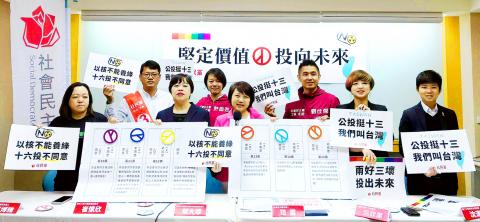The International Olympic Committee (IOC) in a letter to the Chinese Taipei Olympic Committee (CTOC) asked for information about Taiwanese referendum procedures ahead of a plebiscite on whether the nation should request to compete in the 2020 Tokyo Olympics as “Taiwan” instead of “Chinese Taipei,” the national Olympic committee said on Wednesday.
Citing a report by Spanish news agency EFE on the name-change referendum, the IOC asked about voting procedures, but did not mention whether the referendum might affect Taiwan’s right to participate in the 2020 Games, CTOC secretary-general Shen Yi-ting (沈依婷) said in response to questions from local media.
Ten referendums are to be held alongside the Nov. 24 nine-in-one elections, including one that asks voters whether they agree that Taiwan should apply to participate in all international sporting events, including the Tokyo Olympics, using the name “Taiwan.”

Photo courtesy of the Social Democratic Party
For a referendum to pass, it must gain a majority of votes, with “yes” votes exceeding 25 percent of the number of eligible voters.
Central Election Commission Chairman Chen In-chin (陳英鈐) has estimated the number of eligible voters this year at 19.8 million, which means that at least 4.95 million “yes” votes would be required for a referendum to pass.
In a May letter to the CTOC, the IOC said that the name “Chinese Taipei” cannot be changed, because it was determined by an agreement between the two committees in Lausanne, Switzerland, in 1981.
The Lausanne agreement states that Taiwan must use the name “Chinese Taipei” and fly the CTOC flag at international sports events, an arrangement that has allowed Taiwanese athletes to continue to compete internationally after the People’s Republic of China replaced the Republic of China as China’s representative at the UN in 1971.
The Sports Administration yesterday said it would respect the national Olympic committee’s decisions and the timetable it set for the proposed name change.
Considering that the CTOC is a non-governmental organization, it should be granted full autonomy, Sports Administration International and Cross-Strait Sports Division deputy head Yang Chu-yu (楊莒妤) said.

Taiwanese can file complaints with the Tourism Administration to report travel agencies if their activities caused termination of a person’s citizenship, Mainland Affairs Council Minister Chiu Chui-cheng (邱垂正) said yesterday, after a podcaster highlighted a case in which a person’s citizenship was canceled for receiving a single-use Chinese passport to enter Russia. The council is aware of incidents in which people who signed up through Chinese travel agencies for tours of Russia were told they could obtain Russian visas and fast-track border clearance, Chiu told reporters on the sidelines of an event in Taipei. However, the travel agencies actually applied

New measures aimed at making Taiwan more attractive to foreign professionals came into effect this month, the National Development Council said yesterday. Among the changes, international students at Taiwanese universities would be able to work in Taiwan without a work permit in the two years after they graduate, explainer materials provided by the council said. In addition, foreign nationals who graduated from one of the world’s top 200 universities within the past five years can also apply for a two-year open work permit. Previously, those graduates would have needed to apply for a work permit using point-based criteria or have a Taiwanese company

The Shilin District Prosecutors’ Office yesterday indicted two Taiwanese and issued a wanted notice for Pete Liu (劉作虎), founder of Shenzhen-based smartphone manufacturer OnePlus Technology Co (萬普拉斯科技), for allegedly contravening the Act Governing Relations Between the People of the Taiwan Area and the Mainland Area (臺灣地區與大陸地區人民關係條例) by poaching 70 engineers in Taiwan. Liu allegedly traveled to Taiwan at the end of 2014 and met with a Taiwanese man surnamed Lin (林) to discuss establishing a mobile software research and development (R&D) team in Taiwan, prosecutors said. Without approval from the government, Lin, following Liu’s instructions, recruited more than 70 software

Taiwanese singer Jay Chou (周杰倫) plans to take to the courts of the Australian Open for the first time as a competitor in the high-stakes 1 Point Slam. The Australian Open yesterday afternoon announced the news on its official Instagram account, welcoming Chou — who celebrates his 47th birthday on Sunday — to the star-studded lineup of the tournament’s signature warm-up event. “From being the King of Mandarin Pop filling stadiums with his music to being Kato from The Green Hornet and now shifting focus to being a dedicated tennis player — welcome @jaychou to the 1 Point Slam and #AusOpen,” the